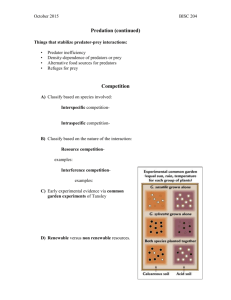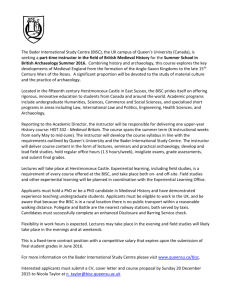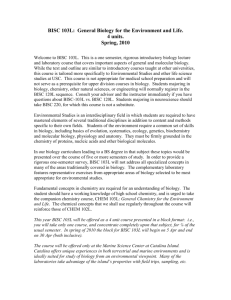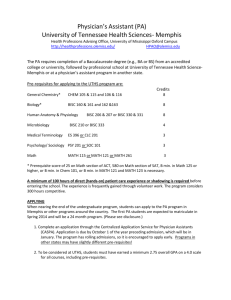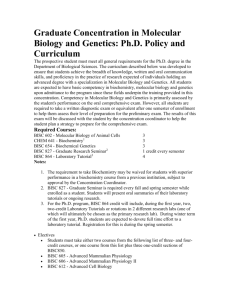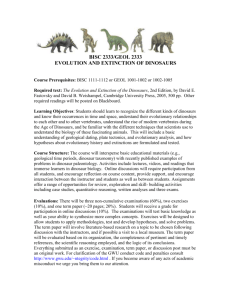COS MS changes - University of Delaware
advertisement
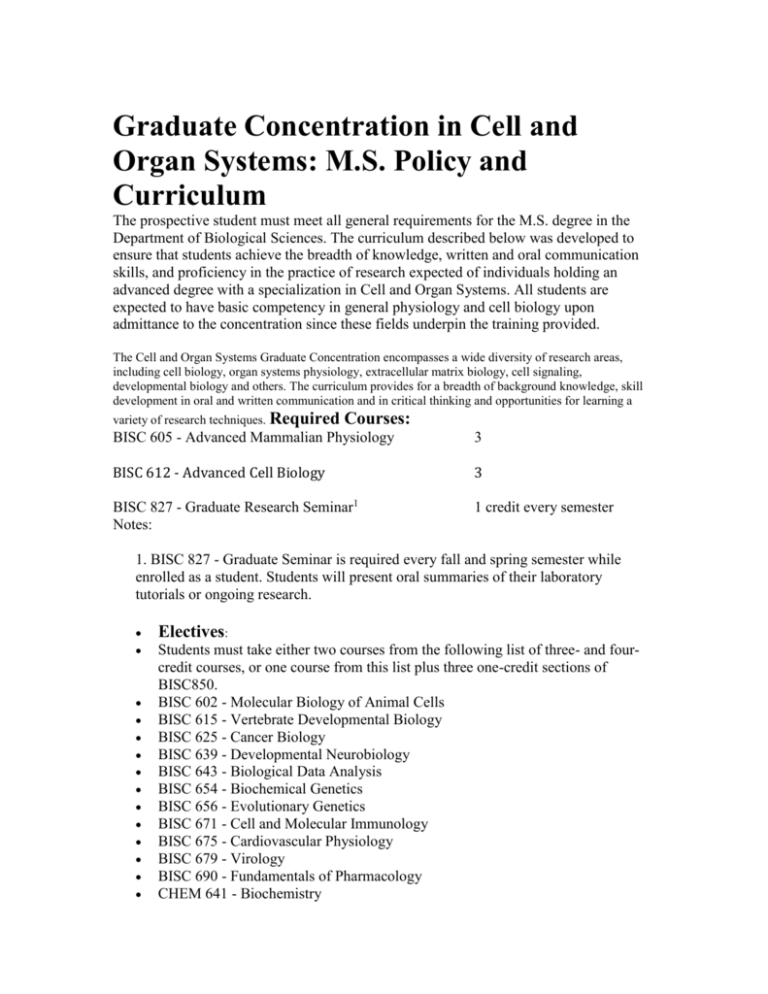
Graduate Concentration in Cell and Organ Systems: M.S. Policy and Curriculum The prospective student must meet all general requirements for the M.S. degree in the Department of Biological Sciences. The curriculum described below was developed to ensure that students achieve the breadth of knowledge, written and oral communication skills, and proficiency in the practice of research expected of individuals holding an advanced degree with a specialization in Cell and Organ Systems. All students are expected to have basic competency in general physiology and cell biology upon admittance to the concentration since these fields underpin the training provided. The Cell and Organ Systems Graduate Concentration encompasses a wide diversity of research areas, including cell biology, organ systems physiology, extracellular matrix biology, cell signaling, developmental biology and others. The curriculum provides for a breadth of background knowledge, skill development in oral and written communication and in critical thinking and opportunities for learning a variety of research techniques. Required Courses: BISC 605 - Advanced Mammalian Physiology 3 BISC 612 - Advanced Cell Biology 3 BISC 827 - Graduate Research Seminar1 Notes: 1 credit every semester 1. BISC 827 - Graduate Seminar is required every fall and spring semester while enrolled as a student. Students will present oral summaries of their laboratory tutorials or ongoing research. Electives: Students must take either two courses from the following list of three- and fourcredit courses, or one course from this list plus three one-credit sections of BISC850. BISC 602 - Molecular Biology of Animal Cells BISC 615 - Vertebrate Developmental Biology BISC 625 - Cancer Biology BISC 639 - Developmental Neurobiology BISC 643 - Biological Data Analysis BISC 654 - Biochemical Genetics BISC 656 - Evolutionary Genetics BISC 671 - Cell and Molecular Immunology BISC 675 - Cardiovascular Physiology BISC 679 - Virology BISC 690 - Fundamentals of Pharmacology CHEM 641 - Biochemistry PLSC 635 - Plant Developmental Biology If any graduate courses equivalent to those listed above have been taken in previous graduate degree programs and have been accepted as graduate level transfer credit by the University, the transferred courses may be used to satisfy the Concentration requirements with the approval of the Concentration coordinator. Other three- or four-credit courses at the University may be used to fulfill the elective requirement if approval from the Concentration coordinator is received prior to taking the course. The Comprehensive Examination Graduate students in the Cell and Organ System concentration are expected to possess a fundamental body of knowledge (see the core competency list http://www.bio.udel.edu/graduate-concentration-cell-and-organ-systems-preliminaryexam-guidelines for more details) as well as the ability to critically analyze scientific literature. To ensure that this is the case, an oral comprehensive examination will be administered to all graduate students in the Concentration. In order to be eligible to take the preliminary exam, students must have completed first year core courses (BISC 605 and BISC 612) with a grade of B or better. Students are required to take the comprehensive exam at a time set by the Concentration Coordinator for as soon as feasible after the first year curriculum has been successfully completed. If the student fails to complete the preliminary exam by this time, the student will be subject to dismissal. Procedure Students will be provided with at least four sets of papers from the primary literature selected by faculty, from which they must choose one set as the basis for their oral examination. These papers will be available at least three weeks before the exam, so that the exam can be administered the first or second week of June for students admitted the previous summer or fall. Students admitted in the spring will usually have paper sets available by December 10 so that the exam can be administered in early January. Two weeks prior to the exam, the student should inform the Concentration coordinator of the chosen paper set. Prior to the exam, the student should prepare slides of all of the figures and tables presented in the papers so that they will available for discussion during the exam. During the exam, the student will be tested by a committee of four to six faculty on the student's comprehension of all aspects of the paper and the core competencies. Students will present a synopsis of the primary paper, then the examination committee will ask questions pertaining to the paper. The committee will also ask questions pertaining to the core competencies as listed at http://www.bio.udel.edu/graduate-concentration-cell-andorgan-systems-preliminary-exam-guidelines. Prior to the exam, students are encouraged to contact faculty to discuss the topics they are responsible for and to clarify difficult concepts. Grading The comprehensive exam committee will grade the student based on: the quality of the student's oral presentation of the primary paper and background information; the student's understanding of the background, methods, results, interpretation, and overall significance to the field of the primary paper; the student's understanding of the topics in the list of core competencies. After the oral examination, the examination committee will determine an appropriate grade. Four grades are possible at the initial exam: 1. Unconditional pass. The student may proceed to the next stage of the degree training. 2. Conditional pass. The student performed marginally in one or more areas and may be asked to complete (with a grade of B or better) one or more courses as a condition for changing the grade to pass. The examination committee may prescribe conditions in addition to, or in lieu of, course enrollment. Once the condition is fulfilled, the student is responsible for informing the Biology Graduate Program Director so that the grade can be changed officially. 3. Re-examination. This result is appropriate for a student whose performance was unsatisfactory, but displayed evidence of the potential to complete graduate degree training. Re-examination must be completed within eight weeks of the initial exam, at a time to be set by the examining committee. The possible outcomes of the re-examination are unconditional pass, conditional pass or failure. The student may not take the exam a third time. 4. Failure. This outcome would indicate that examination committee considers the student incapable of completing degree training. The student's academic progress will be reviewed by the Graduate Affairs Committee, who will make recommendations to the Department Chair regarding the student's enrollment status. The Chair may recommend to the Office of Graduate & Professional Education that the student be dismissed from the Program immediately. Once the student passes the comprehensive examination, the student becomes eligible to register for Master's thesis credit (BISC869). Suggested Schedule: Year One: Fall Semester Course Name and Number Credits BISC 605 - Advanced Mammalian Physiology 3 BISC 827 - Graduate Research Seminar 1 BISC 868 - Laboratory Research 2 Teaching assistantship, development of oral presentation and teaching skills 0 Total: 6 credits Spring Semester Course Name and Number Credits BISC 612 - Advanced Cell Biology 3 BISC 827 - Graduate Research Seminar 1 BISC 868 - Research in the laboratory of chosen thesis advisor 4 Teaching assistantship, development of oral presentation and teaching skills 0 Total: 8 credits Summer Session early June o Comprehensive examination late June, July and August o BISC 868 - Research in the thesis laboratory (3 credits) Year Two: Fall Semester Course Name and Number Credits Elective 3 BISC 827 - Graduate Research Seminar 1 Research in thesis laboratory 6 Total: 10 credits Spring Semester Course Name and Number Credits Elective 3 BISC 827 - Graduate Research Seminar 1 BISC 964 - Research in thesis laboratory 6 Total: 10 credits
